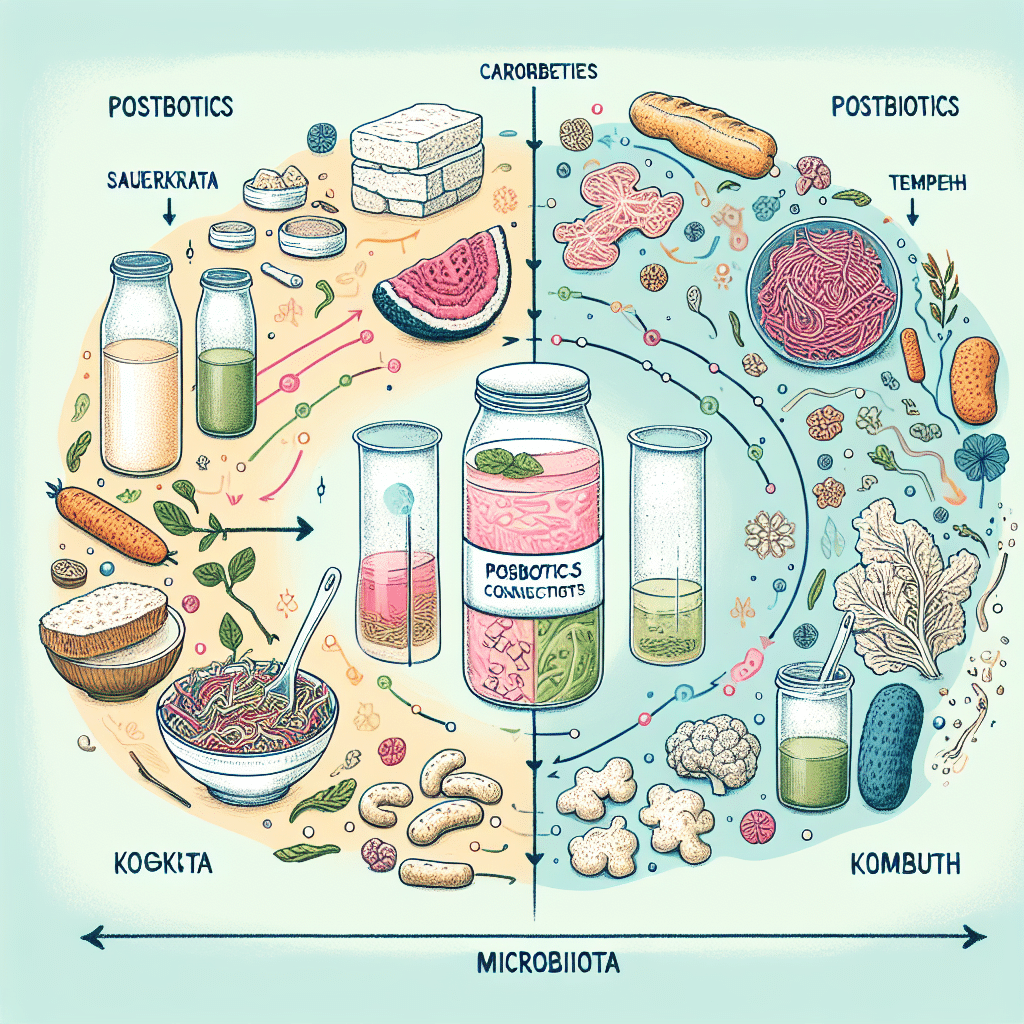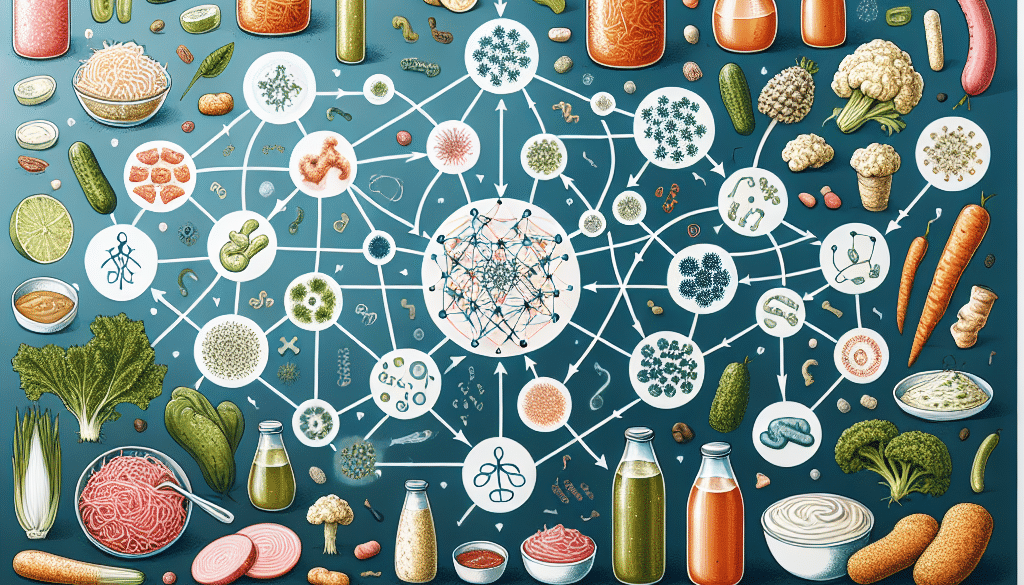Postbiotics and Fermented Foods: Health Connections Explored
-
Table of Contents
- Postbiotics and Fermented Foods: Unveiling Health Connections
- Understanding Postbiotics: The New Frontier in Microbiome Health
- The Role of Fermented Foods in Promoting Health
- Scientific Evidence: The Health Benefits of Postbiotics and Fermented Foods
- Case Studies and Statistics: Real-world Impacts
- Integrating Postbiotics and Fermented Foods into Your Diet
- Conclusion: Embracing the Benefits of Postbiotics and Fermented Foods
- Enhance Your Health with ETprotein’s Protein Products
Postbiotics and Fermented Foods: Unveiling Health Connections

The world of nutrition is ever-evolving, with new discoveries and connections between what we eat and our health being made regularly. Among the latest topics of interest in nutritional science are postbiotics and fermented foods. These two areas have garnered significant attention due to their potential health benefits. This article delves into the intricate relationship between postbiotics, fermented foods, and our well-being, exploring the science behind the claims and the implications for our diets.
Understanding Postbiotics: The New Frontier in Microbiome Health
Postbiotics are a relatively new term in the lexicon of nutrition. They refer to the byproducts produced by probiotics during the fermentation process. These substances include enzymes, peptides, teichoic acids, polysaccharides, cell surface proteins, and organic acids. Unlike probiotics, which are live microorganisms, postbiotics are non-viable bacterial products or metabolic byproducts that have biologic activity in the host.
- Postbiotics are believed to modulate the gut microbiome and enhance health.
- They may have anti-inflammatory, immunomodulatory, and antioxidant properties.
- Research suggests postbiotics could play a role in preventing and treating various diseases.
The Role of Fermented Foods in Promoting Health
Fermented foods have been part of human diets for thousands of years. These foods undergo a process where natural bacteria feed on the sugar and starch in the food, creating lactic acid. This process not only preserves the foods but also creates beneficial enzymes, b-vitamins, Omega-3 fatty acids, and various strains of probiotics.
- Fermented foods include yogurt, kefir, sauerkraut, tempeh, kimchi, and kombucha.
- They are known for their role in gut health, aiding digestion, and enhancing nutrient absorption.
- Regular consumption of fermented foods has been linked to improved immune function and reduced risk of chronic diseases.
Scientific Evidence: The Health Benefits of Postbiotics and Fermented Foods
Scientific research has begun to shed light on the health benefits associated with postbiotics and fermented foods. Studies have shown that these components can have a positive impact on gut health, which in turn can influence overall health.
- Postbiotics may help to maintain a healthy balance of gut bacteria, which is crucial for digestion, immune function, and even mental health.
- Fermented foods have been shown to contribute to a more diverse gut microbiota, which is associated with better health outcomes.
- Some studies suggest that postbiotics could help in the management of obesity, type 2 diabetes, and cardiovascular diseases.
Case Studies and Statistics: Real-world Impacts
Several case studies and statistical analyses have provided insights into the real-world impacts of postbiotics and fermented foods on health. For instance, populations with diets rich in fermented foods often exhibit lower incidences of chronic diseases and improved longevity.
- In regions like South Korea and Japan, where fermented foods are staples, there are lower rates of heart disease and obesity.
- Statistics from the National Health and Nutrition Examination Survey (NHANES) have shown that fermented food consumption is associated with better diet quality and nutrient intake.
- Case studies on individuals with gastrointestinal issues have demonstrated improvements in symptoms after incorporating postbiotics and fermented foods into their diets.
Integrating Postbiotics and Fermented Foods into Your Diet
Incorporating postbiotics and fermented foods into one’s diet can be simple and delicious. Here are some tips for doing so:
- Start by introducing small amounts of fermented foods into your meals, such as adding sauerkraut to a salad or enjoying a glass of kefir.
- Look for high-quality, unpasteurized fermented foods that contain live cultures.
- Consider supplements that contain postbiotics if you are unable to consume fermented foods.
Conclusion: Embracing the Benefits of Postbiotics and Fermented Foods
In conclusion, the connection between postbiotics, fermented foods, and health is a promising area of research that offers potential benefits for gut health, immune function, and chronic disease prevention. By understanding the role of these components in our diet and incorporating them into our daily routines, we can take proactive steps towards improving our overall well-being.
Enhance Your Health with ETprotein’s Protein Products
If you’re looking to further enhance your health and dietary profile, consider ETprotein’s range of high-quality protein products. Their offerings, including organic rice protein, pea protein, and various seed proteins, are an excellent addition to a health-conscious diet. With non-GMO, allergen-free attributes, and high purity levels, ETprotein’s products are suitable for a variety of dietary needs and preferences.
Whether you’re involved in sports nutrition, weight management, or simply seeking to improve your overall health, ETprotein provides comprehensive solutions to meet your protein requirements. Their commitment to quality and customer satisfaction makes them a go-to source for your protein needs.
About ETprotein:
ETprotein, a reputable protein and L-(+)-Ergothioneine (EGT) Chinese factory manufacturer and supplier, is renowned for producing, stocking, exporting, and delivering the highest quality organic bulk vegan proteins and L-(+)-Ergothioneine. They include Organic rice protein, clear rice protein, pea protein, clear pea protein, watermelon seed protein, pumpkin seed protein, sunflower seed protein, mung bean protein, peanut protein, and L-(+)-Ergothioneine EGT Pharmaceutical grade, L-(+)-Ergothioneine EGT food grade, L-(+)-Ergothioneine EGT cosmetic grade, L-(+)-Ergothioneine EGT reference grade and L-(+)-Ergothioneine EGT standard. Their offerings, characterized by a neutral taste, non-GMO, allergen-free attributes, with L-(+)-Ergothioneine purity over 98%, 99%, cater to a diverse range of industries. They serve nutraceutical, pharmaceutical, cosmeceutical, veterinary, as well as food and beverage finished product distributors, traders, and manufacturers across Europe, USA, Canada, Australia, Thailand, Japan, Korea, Brazil, and Chile, among others.
ETprotein specialization includes exporting and delivering tailor-made protein powder and finished nutritional supplements. Their extensive product range covers sectors like Food and Beverage, Sports Nutrition, Weight Management, Dietary Supplements, Health and Wellness Products, and Infant Formula, ensuring comprehensive solutions to meet all your protein needs.
As a trusted company by leading global food and beverage brands and Fortune 500 companies, ETprotein reinforces China’s reputation in the global arena. For more information or to sample their products, please contact them and email sales(at)ETprotein.com today.












